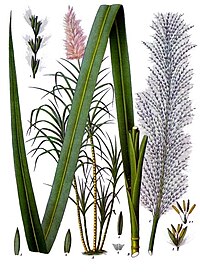
Photo from wikipedia
Lignocellulosic biomass is a source of carbohydrates that can be used in the production of biogas. The aim of this study was to obtain biogas from biomass waste (leaves, stems… Click to show full abstract
Lignocellulosic biomass is a source of carbohydrates that can be used in the production of biogas. The aim of this study was to obtain biogas from biomass waste (leaves, stems and seed bagasse) of Ricinus communis, applying pretreatments such as temperature and humidity. We examined the effect of these pretreatments on the biomass, two enzymatic pretreatments (cellulase and cellobiohydrolase), two chemicals (NaOH and HCl) and two controls (dried castor straw and seed bagasse) on the methane content. The experiment was performed in two anaerobic digestion (AD) assays at a controlled temperature (37 °C) and at room temperature, with a hydraulic retention time (HRT) of 55 days. The results showed that the residues of the seed bagasse produced the highest biogas yields both at room temperature and at the controlled temperature since this material at 37 °C produced 460.63 mL gVS−1 under cellulase pretreatment; at room temperature, the highest level of production was found for the control (263.41 mL gVS−1). The lowest yields at the controlled temperature and room temperature were obtained from residues of Ricinus communis treated with cellobiohydrolase and the seed bagasse treated with alkaline (15.15 mL gVS−1 and 78.51 mL gVS−1, respectively). Meanwhile, the greatest amount of methane was produced by seed bagasse treated with cellobiohydrolase at a controlled temperature (92.2% CH4) and the lowest content of CH4 (15.5%) was obtained at a controlled temperature from castor straw under the control treatment.
Journal Title: Fermentation
Year Published: 2023
Link to full text (if available)
Share on Social Media: Sign Up to like & get
recommendations!